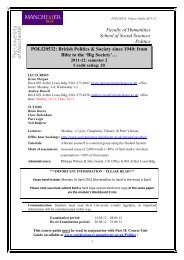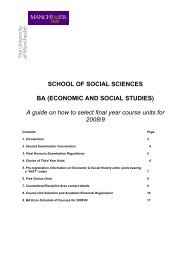CHNN 22, Spring 2008 - School of Social Sciences
CHNN 22, Spring 2008 - School of Social Sciences
CHNN 22, Spring 2008 - School of Social Sciences
Create successful ePaper yourself
Turn your PDF publications into a flip-book with our unique Google optimized e-Paper software.
Don’t forget that this was post-Stalingrad, uncle Joe and all that. The left was on the up and up at<br />
that stage, and the Labour Party quite frankly looked a bit fuddy-duddy. It was just not for us: we<br />
were young and eager. We thought possibly the revolution could come the week after the treaty was<br />
signed. There weren’t really party activities to throw ourselves into. Don’t forget that most people<br />
were away in the war. We were living on the coast where you weren’t (normally) allowed to live.<br />
Sandwich is on the Dover coast and a lot <strong>of</strong> people had been evacuated. It was only the miners in<br />
the pits and their families that were permitted to live there. The hinterland there is agricultural and<br />
not exactly what you call progressive. We must have joined the branch, I think we must have joined<br />
the Deal branch. But it wasn’t exactly a hotbed <strong>of</strong> activity. In London it was different. Because by<br />
that time Dennis was applying for jobs with the BBC and so on we didn’t join the Hammersmith<br />
branch, which we should have done, we joined the Fulham branch, and became semi-active with<br />
them. But they weren’t exactly a hive <strong>of</strong> activity either. Within the NUT and within the teacher’s<br />
group – there was a teachers’ advisory group in the party – I became active in that. I suppose my<br />
main activity at that stage was in the teachers’ group. It was the time <strong>of</strong> the big controversy over<br />
intelligence testing, Brian Simon’s books and things like that. Then Dennis and I split up and I<br />
went to live in Fulham with Bill Wainwright and Molly and their family. They gave me a room and<br />
it was while I was living with them, they went <strong>of</strong>f on holiday to a caravan where there wasn’t room<br />
for me; so I went on a party school down to Hastings, which is where I met Eddie. His marriage had<br />
split, and he and Margory had decided to have separate holidays, and we discovered each other.<br />
When I went to live with Wainwrights, Bill was secretary <strong>of</strong> the British Peace Committee and he got<br />
me involved in. The way that he got me involved was that there were what you called the cultural<br />
peace groups: Teachers for Peace; Medical Association for the Prevention <strong>of</strong> War; Science for<br />
Peace; Musicians for Peace; Authors’ World Peace Appeal and so on. Bill wanted a sort <strong>of</strong> a<br />
communist party liaison maintained between the party members in the groups and I was that<br />
liaison. As a result I met a lot <strong>of</strong> very interesting people who’ve since become knighted and famous<br />
and so on, like Dicky Doll, Sir Richard Doll, and one or two others like that. The communist<br />
influence was quite strong, but the communist membership was very small. As in so many other<br />
organisations, because the communists were organised and knew where they wanted to go, their<br />
influence far exceeded their numbers. The same can be said <strong>of</strong> trade unions and anything else.<br />
They had a very good influence, and because it was co-ordinated they were able to achieve quite a<br />
lot.<br />
T<br />
he British Peace Committee at that time I think was a proscribed organisation. I don’t think<br />
any <strong>of</strong> the groups were <strong>of</strong>ficially affiliated because <strong>of</strong> the proscription; I’m not certain <strong>of</strong><br />
that. I came into the peace committee work just after the big peace petition. I remember<br />
once <strong>of</strong> the first things that happened when I came north was I met Norman Wilson <strong>of</strong> Liverpool<br />
who’d got umpteen million signatures or whatever it was: ‘This is our prize collector’. It was<br />
wonderful. I became national secretary <strong>of</strong> Teachers for Peace quite by accident, because my friend<br />
(Mairie Philbert) had to have a hysterectomy all <strong>of</strong> a sudden. I was thrown in at the deep end,<br />
because Teachers for Peace organised an international conference to which there was quite a<br />
healthy response from different countries – this is documented too – and the government in its<br />
wisdom refused to allow the delegates to land, so that they were arrested. You had eminent and<br />
aged pr<strong>of</strong>essors arriving at Heathrow and being put into a prison cell. It was a two-day wonder.<br />
Mairie came out <strong>of</strong> hospital just before the conference. I did most <strong>of</strong> the organisation <strong>of</strong> the<br />
conference which was very good and an experience for me; and Mairie’s house in Norwood was<br />
besieged by the press. When we wouldn’t open the door they were climbing up the drainpipes. So<br />
this was my first thorough introduction to the paparazzi. They were incredible, absolutely<br />
incredible, even at that stage. During the Rosenberg campaign I had a quire <strong>of</strong> Daily Workers to<br />
sell at Charing Cross, on the pavement outside across Charing Cross station, and an American<br />
serviceman in uniform came and knocked them out <strong>of</strong> my hand, and before I knew where I was I<br />
was surrounded by people picking them up and putting money in my – I sold a quire in about three<br />
minutes and they were giving me notes and goodness knows what. Anti-Americanism, definitely,<br />
and also resentment at treating a woman like that. This was late at night, it was getting on for<br />
midnight. Then I got involved in this Kensington. I can remember very little about that. I was<br />
reading a book very recently and it brought it back to me, I’d forgotten. I wasn’t part <strong>of</strong> the<br />
squatting team, I was part <strong>of</strong> the supply team, rolling up with sandwiches and things like that. But I<br />
met a lot <strong>of</strong> interesting people. The Fulham branch, <strong>of</strong> which I was a member, was vaguely active.<br />
Of course, the party never has been violently active; active in a very genteel way.<br />
Because I was doing the work for Bill Wainwright, dashing hither and thither around London,<br />
37
















